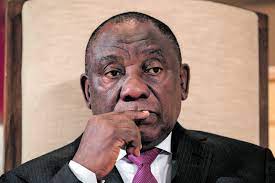In power since the advent of black majority rule in 1994, the African National Congress has lost its absolute majority in parliament for the first time. That’s because with over 97.7% of polling stations accounted for, Africa’s oldest political party could only garner just 40.1% of the votes, according to figures released by the Independent Electoral Commission. This means the 112-year-old party will not be able to command the majority in parliament which would hand it the right according to the constitution to form an exclusive government. It can only do so with opposition parties like the Democratic Alliance (DA), which polled 21.7% of the votes cast, followed by ex-president Jacob Zuma’s MK with 14.8%, and the radical leftist Economic Freedom Fighters (EFF) party with 9%.
Voter turnout was at 58.6%, down from 66% during the 2019 elections.
Under South African law, the 400 elected parliamentarians will be tasked with choosing the country’s next president.
As the results show the 29th May election is the most fiercely fought polls in South Africa since the return to majority rule 30 years ago when iconic anti-apartheid leader Nelson Mandela became the country’s first post-apartheid president.
The ANC credited with freeing the country from apartheid had won successive elections in including landslides which had marked its unshakable dominance of the South African political landscape.
However, its electoral performance has been on steady decline.
After winning elections by nearly 70% of the vote in 2004, its votes slumped to 57% in 2019.
Disillusionment caused by growing poverty and inequality, a protracted economic malaise exacerbated by an acute energy crisis has meant that the ANC was going to struggle to stop this downward spiral in the southern African country of over 59 million people.
By virtue of the latest outcome the ANC will still command the biggest majority in the National Assembly but President Cyril Ramaphosa’s position has been weakened from the election and will have to forge alliances with the other parties to form a coalition government.
The next few days of horse trading with the opposition will be crucial.
The DA leader, John Steenhuisen made it clear in the run up to the polls that his party which espouses ecnomic liberalisation, is not averse to the idea of a coalition government with the ANC.
The ruling party may also look at the possibility of closing ranks with the EFF whose Julius Malema, began as an ANC youth leader, is a staunch campaigner for land redistribution in South Africa
Next in line is Jacob Zuma’s uMkhonto weSizwe (MK) which denied victory to the ANC in its past stronghold in KwaZulu-Natal. MK was born only a few months ago but this did not prevent it from polling a shock 46% of the vote ahead of the ANC which could only manage a paltry 17.6%.
Observers say a long-standing rivalry between Ramaphosa and his predecessor Zuma may determine the outcome of talks between the two men over forming the next government.
WN/as/APA


